The Benefits of a Paint Coating
by Zach McGovernPaint coatings have become quite popular over the past several years. When these coatings were first introduced, only authorized professionals could get their hands on them. Although that is still the case for some of the more exclusive products, now there are plenty of great options that are available for all consumers.
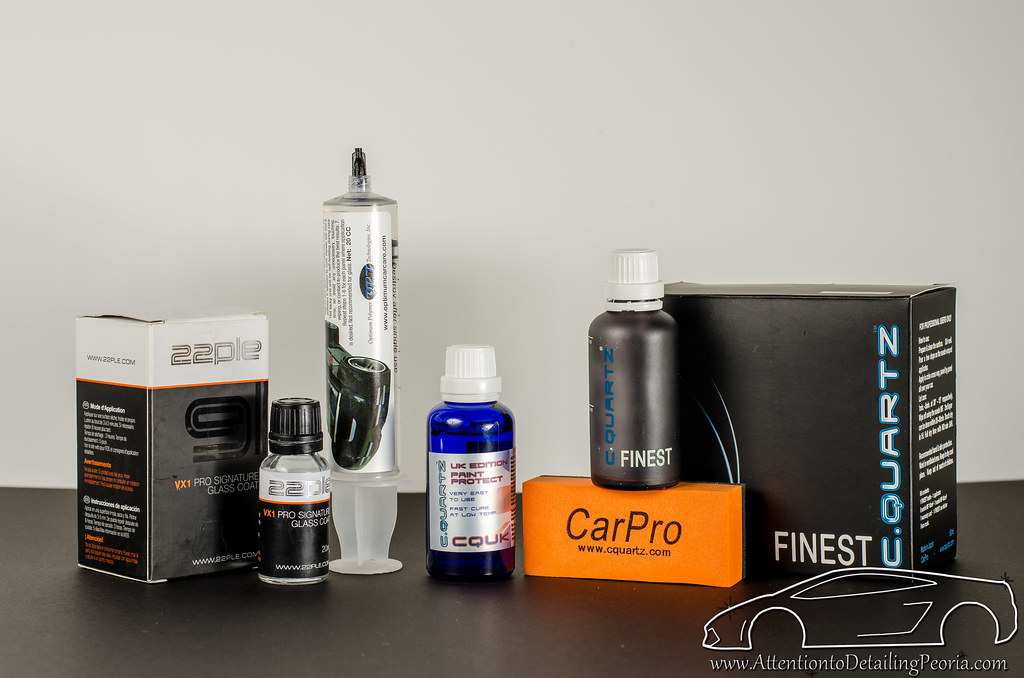 From Left to Right: 22ple VX1 Pro, Opti-Coat 2.0, CQuartz UK, CQuartz Finest (CQuartz Finest is available to authorized installers only).
From Left to Right: 22ple VX1 Pro, Opti-Coat 2.0, CQuartz UK, CQuartz Finest (CQuartz Finest is available to authorized installers only).
As these coating products continue to gain popularity, you might find yourself wondering if they are the right product for you and how they differ from traditional forms of protection like a wax or sealant. I am personally a big supporter of paint coatings and hope to share some information with you that will help you to determine the benefits of a paint coating compared to a sealant or a wax.
Note: For the majority of this article, I will be speaking about coatings in general and not referring to any particular individual product. Many coatings share the same overall benefits, however each product is unique. Be sure to research the differences between individual coating products as you may find that one will suit your needs better than another.
Pros of Paint Coatings
- Excellent Durability & Protection
- Measurable Thickness
- Hardness
- Ease of Maintenance
- Resistant to Contamination
- Hydrophobic Properties
- Intense Gloss and Shine
Durability & Protection
In my opinion, a big selling point of paint coatings is their excellent durability and superior protection. Most coatings will provide several years of life, while offering excellent protection against UV damage, hard water spots, bird bombs, and other typical risks associated with daily driving. Coatings tend to be much more chemical resistant than traditional forms of protection and will stand up to environmental hazards much better in the long run.
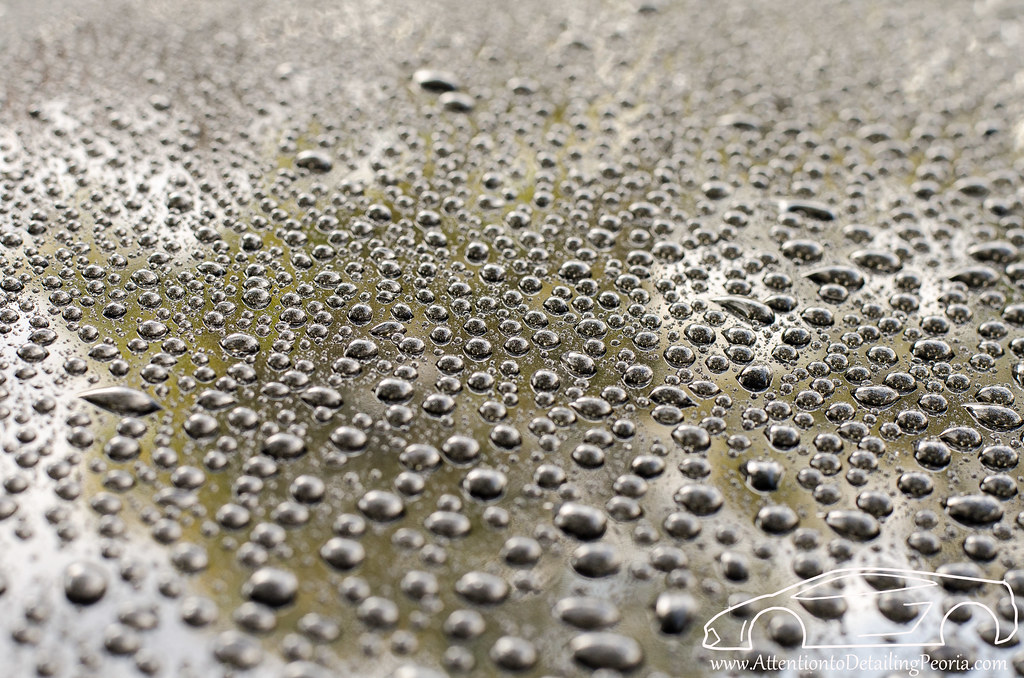 The small, tight beads show the strong layer of protection on the paint.
The small, tight beads show the strong layer of protection on the paint.
Measurable Thickness
Many of us have become accustom to performing a light polish on our vehicles every couple of years to remove minor swirls, water spots, and other defects that have developed on the surface. This polishing process, while usually light, is still removing a small layer of our clear coat. Due to the added thickness of paint coatings (typically between 1-3µm), any light defects that occur after a coating has been installed will reside in the coating and not in the clear coat. The next time you need to lightly polish your vehicle, you will simply be removing the coating and little to no clear coat. This thick layer of protection also helps to make sure bird bombs, bug splatter, and other harmful contaminates never actually reach your clear coat. This will help to preserve your vehicle’s appearance for a very, very long time!
Hardness
Clear coats are very sensitive, and sometimes it seems like no matter how careful you are, it is impossible not to leave behind some very light marring or swirls after washing and drying. Paint coatings are typically harder than your vehicle’s clear coat. This added hardness helps to protect your paint from light marring. Remember, coatings can still easily be scratched, however they can help to reduce the amount of lighter defects from appearing over time. This means you will need to polish your vehicle less often.
Easy to Maintain, Extremely Hydrophobic, and Resistant to Contamination
I’m sure most of us know the feeling you get when you have just spent hours washing and waxing your vehicle, only to park it and return to a car covered in a thick layer of dust. Paint coatings resist dirt and dust better than traditional protection, so your vehicle will stay cleaner for longer periods of time. Your paint will be extremely easy to wash because dirt wipes away easily – no scrubbing is required if you properly maintain your vehicle.
Due to the awesome hydrophobic properties of paint coatings, you will also find that drying is much quicker and easier. You can sheet/flood the majority of the water from the surface and then easily blow the rest off with your Metro Vac N’ Blo or SideKick.
Fewer contaminates will bond to the surface of the coating, so you will find that you will need to clay your vehicle much less often. In fact, treating your vehicle with Iron X a couple of times a year may be all that is needed to remove the bonded contaminates from the coating.
 Coatings provide exceptional beading and sheeting abilities.
Coatings provide exceptional beading and sheeting abilities.
Gloss and Shine
Last, but certainly not least, is the amazing gloss associated with paint coatings. Your vehicle will look fantastic, be easier to maintain, and be very well protected.
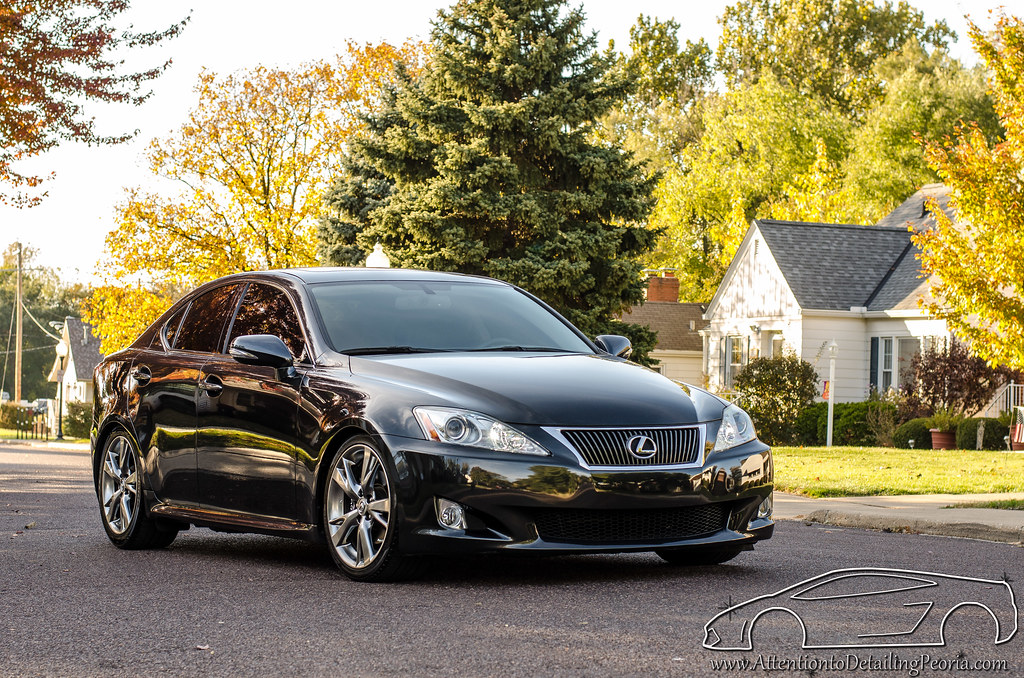 The vehicle shown in the photo above has been coated with 22ple VX1 Pro for a year and continues to look fantastic.
The vehicle shown in the photo above has been coated with 22ple VX1 Pro for a year and continues to look fantastic.
Cons of Paint Coatings
- Price
- Prep Work
- Application
Price
Coating products are significantly more expensive than many traditional protection products. Coatings are typically sold in very small quantities (20-50 mL), so most people consider the price to be a big turn off. These coatings, however, require very little product to cover an entire vehicle. They are applied extremely thin, so it is not uncommon to be able to coat multiple vehicles with one small bottle of product. When you consider all of the superior qualities of a coating, and all of the time you will save after your coating has been applied, the price is not much of a “con” in my opinion.
Prep Work
While traditional sealants or waxes can be applied to a painted surface without having to polish the surface, a coating requires a significant amount of prep. The paint should be polished to near perfection because any defect remaining in your paint will then be beneath the coating and will take more effort to remove it in the future. After polishing, you must be sure there are no remaining polishing oils on the surface of your vehicle as these oils may reduce the strength of the bond between the coating and the paint. To remove these oils, it is usually recommended to wash the vehicle and then wipe the paint with diluted Isopropyl Alcohol or CarPro Eraser. Once you are certain that your paint is surgically clean, you may apply the coating. Again, it is important to note that every product is different, so be sure to carefully read the instructions provided with each coating and follow the guidelines for prep and application.
Application
Coatings require more time and more finesse in terms of application compared to traditional waxes or sealants. Coatings are often more sensitive to ambient conditions, like temperature and humidity, so you must monitor the coating closely to ensure proper application. Once you get the hang of it, it’s really pretty simple!
*Be sure to carefully read and follow the manufacturer’s directions for surface preparation and coating application!
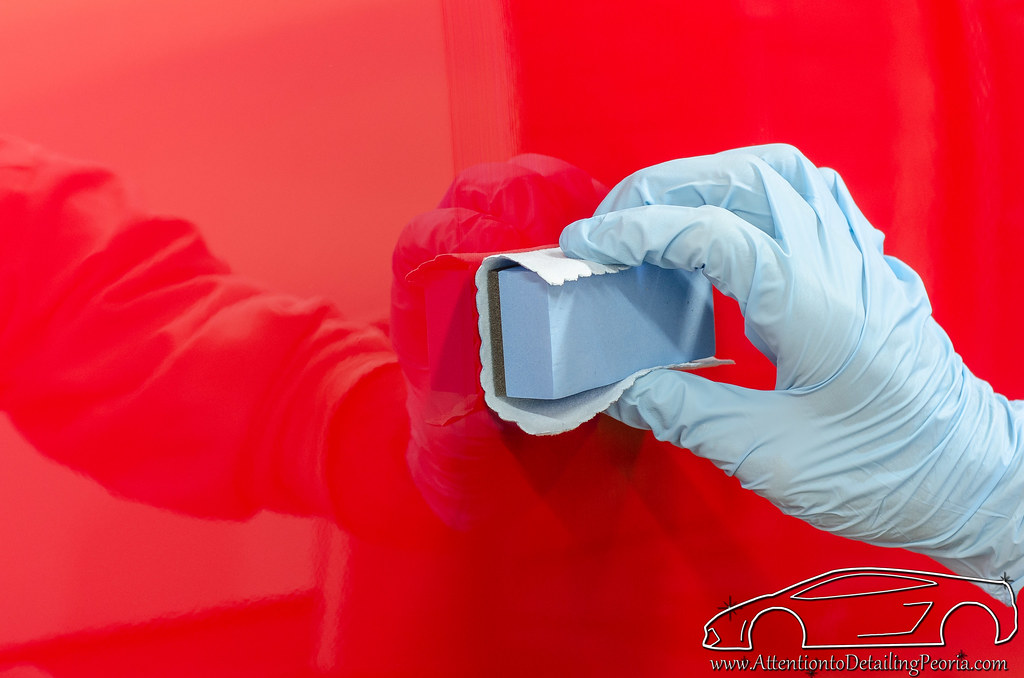 The image above shows 22ple VX1 Pro Being Applied using a CarPro applicator block wrapped in a microfiber suede cloth.
The image above shows 22ple VX1 Pro Being Applied using a CarPro applicator block wrapped in a microfiber suede cloth. 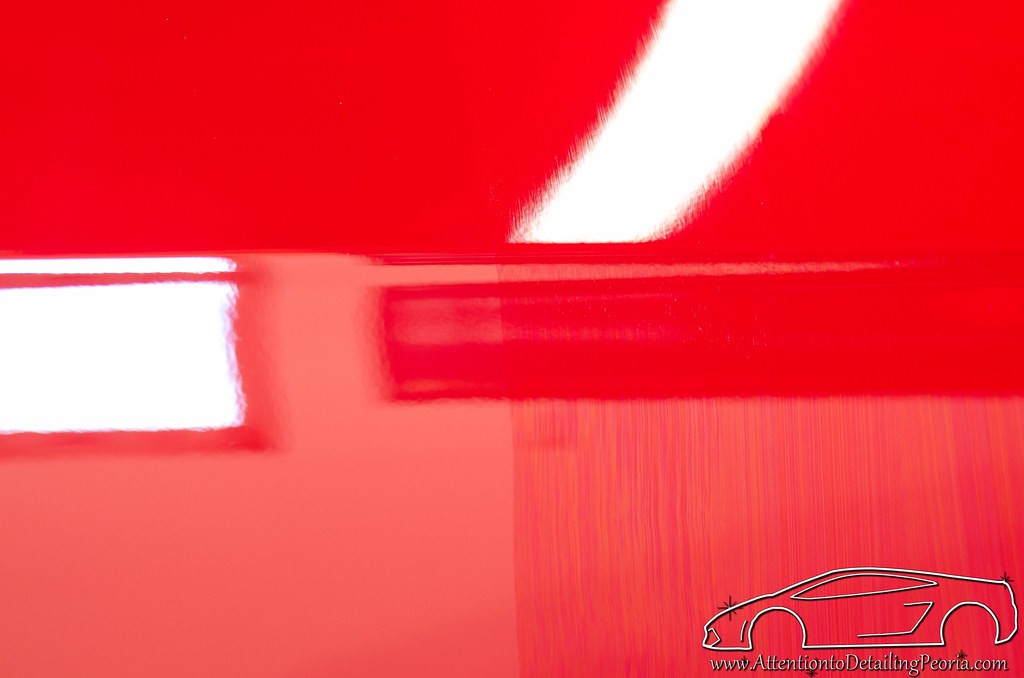 The image above shows 22ple VX1 Pro immediately after application. After several minutes excess product is wiped away to reveal a glossy finish.
The image above shows 22ple VX1 Pro immediately after application. After several minutes excess product is wiped away to reveal a glossy finish.
Hopefully this article has provided you with a basic understanding of paint coatings. These products can be great for both daily drivers, show cars, and everything in between. It is also worth noting that many of these great products can also be used to protect other areas of your vehicle such as wheels, exhaust tips, and trim pieces.
Be sure to check out the many different coating products available at Detailed Image (click here to be directed to the Detailed Image Coating Page), and be sure to ask if you are unsure which product is right for you!
Thanks for reading!








Really good comparison of pros vs. cons!
I’m sure everyone who uses coatings agree’s that the pros heavily outweigh the cons. I’ve had half of my personal car coated for a little over a year and the difference between the coated and un-coated side are night and day! A good sales tool as well.
Thanks for reading! I’ve got both of my personal vehicles coated, and I will never go back to traditional protection. The ease of maintenance is simply amazing… and the gloss is stunning.
Thanks Zach, for the great input.
Coatings are definitely amazing all around.
I haven’t used my waxes in a long time and hardly use any paint sealants anymore, due to the high demand of coatings from our customers.
Thanks again.
Hey Miguel, thanks for taking the time to read and comment! I too rarely use wax anymore unless specifically requested by my customers, and sealants are starting to die down as coatings gain popularity. It’s hard to say no to all of the awesome benefits that coatings have!
Great article, nice and simple. Two points that I would just like to add on to. Number one is the preparation. This is an extremely important step, so whenever you are going to be applying a coating, take the time to do the preparation properly. Don’t just breeze through it. Second, when it comes to application, I want to take some of the mystique out of coating application. Most of the issues that I see arise are when people use the same methods behind wax and sealant application to coating application. IMO, it’s not that coatings are more difficult to apply, they are just different. If you are used to doing things a certain way, doing it a different way will always seem difficult at first. Always make sure you read through the application guides completely and always leave PLENTY of time to get the application done if you are new to coatings.
Thanks Kevin. I completely agree. As I stated in the article, prep is absolutely critical for maximum coating performance. Very good point about application – often times when something is new or different, people consider it to be challenging or poor. Coating application may take some practice, but in general, it is not any different than learning to properly apply a new wax in my opinion.
Nice , article Zach. I don’t know if you care to compare specific products, but I’m using c2v3 and I’m very pleased with the results so far. I’m curious how it compares against the products that professionals use.
Jim F
Hey Jim,
I will be completely honest with you, I have no experience with any of the GTechniq products so I cannot provide any details on how they compare to other products I have used. At the moment, the coatings I offer to my customers are CQuartz UK (<- consumer based, available to anyone) as well as CQuartz Finest and Opti-Coat Pro (both of which are available to authorized professionals only). Greg's recent article "A Conversation with Barry Theal of Presidential Details" briefly discusses these 2 professional coatings.
Let me know if you've got any other questions!
Nice Zach.
With coatings like CQuartz Finest, Modesta and OCP it’s hard to not find something that is a great long term value.
Enjoyed the article. I have my first 22ple application scheduled for next Wednesday on a new Audi RSS. It’s a repeat customer and we are both excited to see the results. I plan on using the specific rim version for the rims and exhaust. Do you do recommend that as well for the heat difference or do you use the same pro version all everything?
Hi Jim, thanks for leaving a comment!
I have found that VX1 Pro does a good job on painted rims, but my thoughts have always been that if there is a product created specifically for the application you are seeking (ie rims & exhaust), then why not use it? 22ple clearly created it to be superior in those types of applications, therefore I would recommend using the VM1 over the VX1 if at all possible.
Thank you Zach
A couple of question I have posted on another blog but will ask you as well.
I have watched various application videos for the CQuarts product (You Tube) and there seem to be conflicting thoughts on a two coat application.
One being let the first coat cure (24 hour) before applying a second coat.
The second onion was to apply the second cote before the first coat cures after about an hour,
The reason given for this is that the second will adhere better to the first before it is cured.
Any thoughts
Thanks
Steve
Hi Steve,
If you are layering CQuartz, you need to wait a minimum of 1 hour in between applications (info directly from the CarPro site). I would suggest applying shortly after this 1 hr mark and not waiting a full 24 hours for the same reasons you mentioned.
Hope that helps!
Understood Thanks
I really like your blog. Thanks for educating us with paint coating applications. It really protects our investment.
Quick paint coating question – If I understand correctly after applying 22ple or similair there will be no need to apply wax or sealant to the vehicle, like in 6 months. The shine and protection will remain for up to 2 years? Is this correct? After wash car will shine and look good.
Like most people I enjoying washing and waxing the car, not sure I want to give that fun up.
Thanks
Dan, you are correct! With routine maintenance, your vehicle will continue to have that “just detailed look” for up to two years (and possibly more)! If you’d like to take the protection and durability of your coating to another level, I recommend a slightly more advanced maintenance routine that involves decontaminating with CarPro IronX & TarX every 4-6 months (or as needed) and then following with CarPro Reload. Reload is a Silica based product (like 22ple and CQuartz) that works very well on top of coatings for those of us who would like to ‘boost’ our coating! Thanks for reading!
Hi Zach,
I’ve just got bought a new Golf GTI, and a bottle of 22PLE. Just wondering, would you recommend polishing? Or do you think a decontamination, clay, IP wipe down will do? I’ve got some DODO lime prime/lite and Menzerna FG500, PF2500, SF 4000 laying around. Would I be able to use the DODO lime prime lite for a bit of a non-abrasive polish before laying down the 22PLE? Read so many threads, let me tell you, paralysis by analysis!!
Thanks!
Ken
Hey Ken,
I always advise a light abrasive polish prior to coating regardless of vehicle age. This is the only way I feel the paint is perfectly clean, glossy, and ready to be coated. If there are no swirls or defects to correct, my pre-coating process would be something like this: a thorough wash & decontamination process, followed by a light polish such as SF4000 on a Crimson Pad, and then a careful wipe down with CarPro Eraser. Then I would feel the vehicle is properly prepped and ready to be coated. Hope that helps!
-Zach McGovern
Hi Zach,
Thanks for your reply. You have helped me a great deal! I’m in Australia, and the sales people don’t want to talk/help me with about anything, they just want my money :(. I’ve only got Lake Country: Orange, White, Black and Blue pads. Could I use one of them instead?
Ken
Ken,
A Lake Country Black or Blue pad would be a fine choice for a very light polish! Let me know if you’ve got any more questions.
-Zach
Knowing that I will have paint protection film applied to the most chip-prone areas, what is the proper sequence in terms of cleaning, paint correction, PPF and coating?
From a practical perspective, it seems that most detailers either perform the paint correction/coating or PPF, but not both. It seems that the cleaning and paint correction must be done first, then the PPF is applied and then the coating is applied to all. Is that correct?
If yes, it seems that the car needs to go back and forth between shops which can add some inconvenience and logistic challenges, especially if both jobs take up to three days to complete (in total). If no, then please explain.
Also, the shop doing the PPF will clean with iso-propyl alcohol (sp?) before applying the PPF. Should they avoid applying an exterior sealant if it is going to be coated? Thanks and great info.
Hi Gary – you will find that some detailers are capable of performing both the correction, PPF installation, and coating installation in house… but as you mentioned, in many cases this will be handled by 2 different parties. The detailer is responsible for cleaning, paint correction, and coating installation while the PPF is installed by another company. In situations like this, I encourage you to speak with the detailer first to determine if they have a PPF company that they work with. If so, the 2 parties may be able to work together in one location to make it easier for you (ie the detail and PPF work done at the PPF shop).
Your process is correct – the car should be properly cleaned, decontaminated, corrected/polished, then the PPF should be installed where needed, and then the paint coating should be installed over the entire vehicle including PPF.
Hope that helps
I have an older Toyota and the clear coat is turning chalky on the top panels. If I apply this product on these surfaces will it hide the white spots(chalky spot) and also keep the remainder of the clear coat from chalky ? Thank you very much.
Hi Jack – if the clear coat is chalky, it is likely failing. The only way to fix this is to have the damaged areas repainted. A paint coating will not hide existing clear coat failure, and once it has started a coating will not stop it from spreading. If you have existing clear coat on other panels that is in good shape, a nano coating will help to provide some UV protection.
Hi Zach, Just wondering do you think CQuartz UK will withstand Arizona weather. Our summer sometimes goes to 110-120 degrees. Thanks
Hi Rey – any nano coating will hold up just fine to summer heat. Take your pick of the many great coating options out there and I’m sure you will enjoy the ease of maintenance after applying.
I am thinking of getting another coat of auto paint on my car because it is getting older and I want it to stay in great shape. Besides increasing the durability of my car, I had no idea that there are so many other benefits like the fact that it will create a hardness that will protect my paint from chipping. Also, you make a great point that this spray paint will make it easy to clean and maintain and that would definitely be a huge benefit for me because it will save me a lot of time.
It would be nice to have durability in my car. Maybe I should get a paint coating. That would be good for the durability.
It’s very informative when you said that paint coating can promote easy maintenance, durability, hardness, and intense gloss and shine. My brother is looking to repaint his living room as well as his car. I will advise him to find reputable paint stores who can provide him quality coating to ensure durable finishing.
That is nice to know that paint coatings have excellent durability. Maybe it would be good to go to a paint store to get some paint coatings. Then I could have someone apply the paint coatings to my car sometime soon.
hi zack, great article of the pros and cons, like you said its not really a con, got my truck coated and its when customers see the water just running off my pickup then the question come out, its been over a year since i did my pickup and been coating customer veh, most of the customers thought it was for high end cars till i explained it to them, then when i finished there veh thats when they realized the ease of maintanence, great article and write up about it with the explanations,have a great day
It’s nice that paint coatings are durable and protective against UV damage. One of my uncles is working on building a home for his family, so he may want to learn about this. Thanks for all the great information on coatings and their benefits.
How do you know your vehicle has been coated? I have a used ’93Town Car which appears coated. I have tried polish, glaze and wax. They all leave marks. What steps are needed to start over? Thank you.